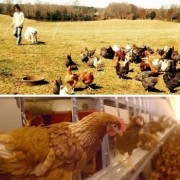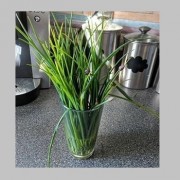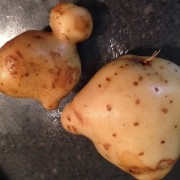Which one is organic?
Here’s an easy way to find out if your food is good for you and the planet
– By the Veggie Fairy Team:
Which image do you think shows an organic egg-producing farm approved by the USDA?
The top image is from a multi-generational family farmstead in the rolling hills outside Richmond, Va. Their hens spend their days in open pastures, foraging and engaging in natural behaviors like dust baths and flying short distances.
The bottom image is from a complex of 9 big barns crowded with 1.6 million hens up in Michigan. The closest those hens come to being outside is in a “porch” attached to their barn that’s screened on one side.
So which operation has been certified organic by the USDA? If you guessed the top one, you’d be wrong.
Most of us would assume that a label that says “organic” would be the easiest way to make sure you’re getting the best food for your money. Completely understandable! But that’s just not the case.
Herbruck Poultry Ranch in Saranac, Michigan, (the bottom image), is USDA organic and was featured recently in The Washington Post. The article explains how big, industrial farming operations like Herbruck are using the government’s official organic certification process to their advantage.
At Avery’s Branch Farms in the rolling hills of Amelia Court House, Va., (the top image), the Alexander family live and work there alongside their chickens, turkeys, ducks, pigs, and cows, using sustainable, pasture-based farming methods to produce nutritious, delicious food.
Pasture-based: The real gold standard
The Alexanders and their animals live close to the land. In the woodlands, the pigs root around for acorns and other piggy goodies the way they were meant to. Out in the pastures, the cows graze on a diverse mixture of grasses, their natural diet. During daylight hours, the flocks forage in the pastures, too, under the watchful eyes of the family’s Great Pyrenees guard dogs, who protect them from predators. At night, the birds nest safely inside their hen houses.
By the way, those hen houses are on wheels so they can be moved from pasture to pasture, following behind the cows. The hens’ low-stress, healthy, natural lifestyle is great for the girls… and their eggs, which are much more nutritious and flavorful than commercial factory-farmed eggs.
For example, their pastured eggs are up to twice as rich in vitamin E, and two to six times richer in beta-carotene! You can see it for yourself in the egg yolks. Crack an egg from a pasture-raised hen into a pan and then next to it crack an egg from any other kind of hen — conventional or so-called free-range or cage-free, organic or not. The pastured egg will be a deeper, brighter yellow. The others? Much paler.
The Alexanders’ animals are raised from start to finish on lush pasture. They’re fed no hormones, antibiotics, or synthetic chemicals. This is the old school definition of organic, before Big Industrial Agriculture got hold of it. Not only does the old-fashioned way produce more nutritious food, it’s also much more humane for the animals and better for the environment — the farmer is working with nature instead of against it.
“It’s our goal to provide the community with the most nourishing products possible, while also protecting the land,” the Alexanders explain. “We have never used any chemical fertilizers, pesticides, or herbicides on our farm.”
So how can you know if your food is genuinely good for you and the planet?
Okay, so the organic label is no guarantee. Cracking open eggs and comparing them is eye-opening, but you waste a lot of eggs that way.
The best way to find out if your food is any good is to get to know each farmer and food artisan who produces the things you eat. That sounds hard and time-consuming, and it is if you do it yourself. But it’s easy if you have someone you can trust to do it for you.
At Seasonal Roots, that someone is Sam, our Farmer Connector, backed up by Duane, our founder and Head Veggie Fairy. Sam researches and gets to know everyone who makes the food we home-deliver to our members, including the Alexanders. You can get to know them, too. Next to every item on our menu is a small image of the farmer or food artisan who provided it. Click on that image, and you can read their story and find out what you need to know.
Eating fresh local food from people you know and trust is the easiest way to live your values — whether that’s a healthy diet, a low carbon footprint, supporting local farmers and your local community, protecting the local environment… or all of the above. As a Seasonal Roots member, you’re supporting sustainable local agriculture and making a difference for yourself, our community, and the planet!
ABOUT SEASONAL ROOTS
Since 2011, Seasonal Roots’ online farmers market has connected Virginia families with local family farmers who use sustainable, humane practices. Our veggie fairies – mostly moms who believe in living better through scrumptious, healthy eating, being kind to animals, protecting the environment, and spreading joy – home-deliver freshly harvested produce, pastured eggs, grassfed dairy and meat, plus artisan fare. We empower our members to eat better and live better with more nutritious, flavorful food that’s good for us and good for the planet. More info at seasonalroots.com.



